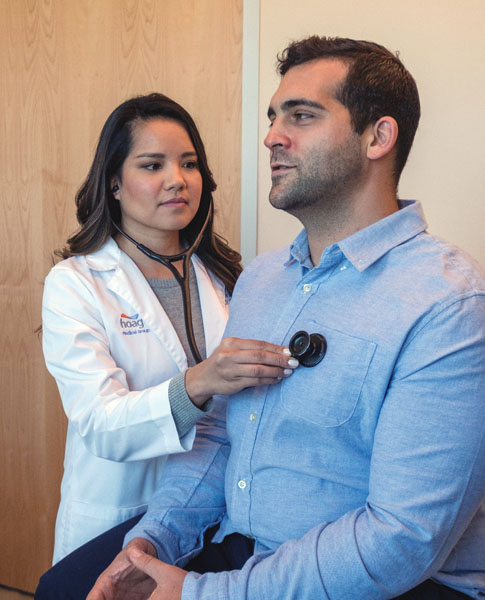
Your team of experienced providers at Hoag Urgent Care are trained to provide a wide variety of medical care to patients of all ages. Many medical situations do not require an emergency room visit, at the same time, you might not be able wait until your primary care doctor can see you. For broken bones, bad colds and other aches and accidents, Hoag Urgent Care is the perfect choice to help you feel better faster.
If you experience crushing chest pain, loss of consciousness, severe bleeding, trouble breathing, or signs of stroke, call 9-1-1.
COUGHS
Chest Cough: the coughing is your body’s attempt to remove mucus from your chest. Dry Cough: cough that results from the throat being dry due to a lack of mucus. Bronchitis: a cough accompanied by a yellow-gray phlegm and cold-like symptoms. Post-Viral Cough: a cough that results from throat inflammation after an upper respiratory infection. Whooping Cough: a cough that starts as a mild cold and becomes severe, produces thick phlegm and is very contagious.
You should seek medical care for your cough if you experience any of these symptoms:
- Chest pain, wheezing, or shortness of breath
- Coughing up blood or bloody-looking mucus
- Coughing up yellow or green mucus
- Running a fever of 101 or more
SORE THROATS
Adults should see a doctor if a sore throat lasts longer than a week, you have trouble swallowing, breathing, or opening your mouth, you have an earache, rash, joint pain, a fever above 101 F, blood in your saliva or phlegm, or have frequent sore throats.
The American Academy of Pediatrics recommends seeking medical care for your child if his or her sore throat doesn’t go away after they have a drink. Get immediate medical care if your child has trouble breathing or swallowing or they seem to have unusual drooling.
FLU
If, however, you have symptoms of flu and are in a high risk group, or are very sick or worried about your illness, contact your health care provider.
COLDS
SINUS CONGESTION
Adults should get medical care if you run a high fever, symptoms persist for more than 10 days, yellow/green mucus with pain and fever, if there is blood in the mucus or if there is mucus discharge following a head injury.
ALLERGIES
However, allergies that block your nose with mucus can lead to a sinus infection. If your allergy medication doesn’t give you any type of relief, see your doctor for more treatment.
EYE PAIN
EARACHES
HEADACHES
- Seizure, weakness, dizziness, loss of balance
- Numbness or tingling
- Difficulty with speech, vision, or breathing
- Confusion or unusual behavior
- Fever, stiff neck, or rash
- Head pain that wakes you up from sleep
- Severe nausea and vomiting
- Pain related to any head injury
- You are over 55 and experience a kind of head pain you have never felt before
- Get head pain from coughing, bending, sexual or physical activity
Speak to your doctor if you have more than 3 headaches per week, experience head pain that gets worse or does not get better, have pain that causes you to take a pain reliever more than 2-3 times per week, or if your head pain interferes with your daily life.
STOMACH PAIN
NAUSEA AND VOMITING
Dehydration is a concern when you are vomiting. Try to drink fluids if possible. If you feel very thirsty, have a dry mouth, less than normal or dark-colored urine, weakness, or dizziness, you may be dehydrated. If this occurs, seek medical care.
CONSTIPATION AND DIARRHEA
If your bowel movements are watery, then you have diarrhea, which most people get about twice per year on average. If you have diarrhea more than 3 times per day for more than 2 days, you have a fever over 101 F, unexplained weight loss, severe pain, or if you have blood in your stools, see a doctor. Additionally, dehydration is a concern when you have diarrhea. Drink plenty of fluids and see a doctor if you feel very thirsty, have a dry mouth, less than normal or dark-colored urine.
URINARY DISCOMFORT
For many women, these symptoms can be related to a urinary tract infection. Other symptoms of a UTI are an urge to urinate or increased frequency, fever, strong or bad smelling urine, cloudy or bloody urine, and side (flank) pain. Similar symptoms may also indicate a yeast infection.
VAGINAL DISCOMFORT AND CRAMPING
Cramps that are severe or that occur during an unusual time of your menstrual cycle, may have an underlying medical issue. Cramps can be part of your normal menstrual cycle but they can also indicate a yeast infection, UTI, or STD that needs to be treated by a medical professional. If you are pregnant and experiencing cramps, contact your doctor or seek medical care immediately.
STDs
FRACTURES AND BROKEN BONES
If the injured person has lost consciousness, if the injury is in the person’s head, neck, or back, if the bone has broken through the skin, or if the bleeding is heavy, do NOT move the injured person. Call 9-1-1.
STRAINS AND SPRAINS
SCRAPES, LACERATIONS AND STITCHES
BACK AND MUSCLE PAIN
Back pain is one of the most common reasons for a doctor’s visit because it can make sitting, sleeping, walking or even standing painful. Back pain’s most common causes include muscle or ligament strain, bulging or ruptured disks, arthritis, skeletal issues, or osteoporosis. Whether you had an injury or if you don’t know why your back pain even started, know when to see a doctor: if the pain causes bowel or bladder problems, you have a fever, you have fallen or had any kind of accident, if the pain does not go away after resting, if pain goes down one or both legs, or if you have any unusual weight loss.
SLIVERS, PUNCTURES AND WOUNDS
Punctures or wounds need to be cleaned and covered for a few days in order to keep the wound clean while it heals. If you are unable to clean a wound or if the puncture is deep, seek medical care. Hoag Urgent Care providers can ensure a wound is cleaned properly and provide stitches, when needed. It is important that a deep wound gets stitches within 6 hours of an injury. Additionally, depending on the source of the wound and the date of your last tetanus shot, a tetanus booster may be required and can be provided in the urgent care.
INSECT STINGS AND ANIMAL BITES
If you are bitten by an animal, you should seek medical care if you experience any of the following:
-
- The bite is deep, bleeding severely, or if the skin is torn
- The bite area swells, becomes red, is painful or there is oozing from the bite puncture
- The bite was from a wild animal or if you do not have documentation that the domesticated animal that bit you has a current rabies shot
- You were in contact with a bat, even if you do not believe you have been bitten
- You have not had a tetanus shot in the last 5 years
INFECTIONS
RASHES, ITCHING AND SKIN IRRITATIONS
MINOR BURNS AND SUNBURNS
If you have been in the sun and your skin becomes red and painful, you likely have a sunburn. A severe sunburn can be accompanied by blisters, fever, chills, nausea, headache, or weakness. If you have a severe sunburn or if you have signs of dehydration, seek medical care.
TETANUS SHOTS
Tetanus is a severe disease caused by bacteria that can show symptoms up to 10 days after exposure. Symptoms include: spasms or stiffness in your jaw, stiff neck, trouble swallowing, tight abdominal muscles, painful muscle spams (triggered by noise, touch, or light), fever, sweating, high blood pressure and heart rate.
SPORTS PHYSICALS

Last 30 Days
at Hoag Urgent Care
With Online Check-in
Check-in To Discharge

